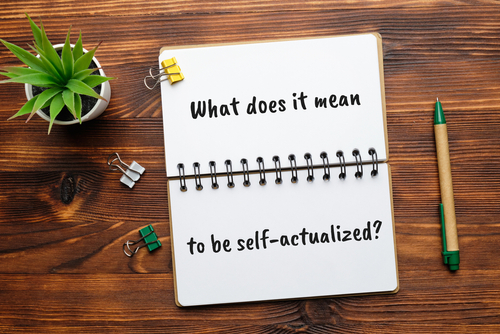Each of us goes through a process of discovering ourselves and searching for our place in the world, society, and relationships. We grow up in different social environments, some of them liberal, some quite restrictive. Being able to grasp the meaning of being authentic and the main traits of self-authenticity, finding your true self, and feeling free to express it without fear of judgment or punishment can feel like a rare privilege for some.
Even those of us who were lucky enough to be born and live in liberal societies struggle to achieve self-authenticity and are frequently led astray by that nibbling inner voice convincing us that we might not be good enough and explaining how we need to contort our personality to fit that image of perfection that was created for us by society, culture, or family.
However, some studies show that hiding your authentic self may lead to a wide range of negative emotional and psychological consequences, such as low self-esteem, stress, anxiety, and depression among others. Achieving self-authenticity is therefore essential, albeit difficult.
What Causes Problems With Achieving Self-Authenticity?
Think of all the times you kept your mouth shut when your friends were doing something you considered wrong or had to quietly listen to authority figures wishing you could talk back and express your thoughts and beliefs.
In doing all these things we actually hurt our true selves. We tell ourselves our feelings don’t matter, consequently drawing subconscious conclusions that we, our true selves, don’t matter. This kind of behavior can provoke feelings of guilt, shame, and angst. Some of the barriers preventing us from achieving self-authenticity are self-imposed while others are imposed by the society we grew up and live in.
The most common issues that might stop us from achieving self-actualization could be:
- Abuse or trauma. Various levels and forms of neglect, abuse, or trauma can leave scars and result in building defense mechanisms to cope with them. This can push people into developing a “false self” quite early in life.
- Genetically determined traits cause differences in temperament and our emotional or psychological predispositions. The genes we inherit from our parents interact with the environment we are born into and shape our future development.
- Family dynamics. No parent is perfect so naturally, interactions with parents or caretakers who might be doing their best can still cause damage to a child’s development of self. In worst cases, various types of abuse or neglect can be severely damaging to a child’s personal identity.
- Gender roles and cultural ideals of how men and women are supposed to act or look are quite strict in most societies. Most of these traits, aside from some genetic differences, are not innate. People adopt a lot of gender stereotypes through socialization, preventing them from expressing their true selves.
- Body issues. This is an extremely powerful pressure people deal with during most of their lives. The mainstream culture sets beauty standards that make most of us feel less worthy if we don’t conform to them or at least strive to through excessive diets, exercise regimens, or corrective surgery.
- The need to constantly appear happy and content, to seem confident even if we’re generally insecure or shy, or not show that we’re nervous whatever the circumstances.
- Conventional ideas of success. Everybody has their own idea of success, and not all of us want great careers, big families, or a lot of money. The definition of success based on status and income makes a lot of people give up their dreams and evaluate themselves according to norms that are far from their own.
- Perfectionism. Trying to be perfect in everything we do and the way we act is an impossible goal some of us subject ourselves to. Studies have shown that many people who strive for perfectionism and are afraid of failure battle depression and experience suicidal thoughts.
- Conforming to rational models of thinking. The idea that our feelings get in the way of being rational and making sound decisions dominates some people’s thinking and makes them suppress their feelings. However, all our feelings, including negative ones like anger, anxiety, or depression are part of our true selves and need to be addressed instead of suppressed.
- Death awareness. At a certain age, all of us get struck by the realization that we and everybody else we know and love will die. This can cause us to adhere to certain ideologies or belief systems, present in our culture or family, that provide comfort and relief from fear of death.

What Are The Signs Of An Inauthentic Person?
It’s quite common for people to take on inauthentic characteristics, attitudes, or behaviors because they feel pressured by others or believe it might help them achieve a certain type of success. We focus on appearances and in doing so we might lose our way and harm both ourselves and those around us.
You can recognize inauthentic people by some of the following behaviors:
- Showing off and being full of themselves.
- They are judgmental and manipulative.
- Hiding their true emotions behind aggression.
- Not admitting their flaws and mistakes.
- Constantly seeking attention.
- They’re people pleasers.
- Demonstrating unrealistic perceptions.
- They’re cynical with a hostile sense of humor.
- Inconsistent.
- Snobby about people they’re friends with, or tend to surround themselves with people they can easily manipulate and exercise their authority over.
How Do You Know You’ve Become Self-Authentic?
This is not an easy question to answer because self-authenticity can mean different things to different people. However, being self-aware, getting to know yourself, and allowing your behavior to reflect those feelings without the need for external validation is an effective way to begin the process of becoming self-authentic. It means caring for yourself and not looking for something outside of yourself to complete you.
What are the traits of an authentic person? You can consider these general guidelines to see if they apply to you and your behavior:
- Being accepting of yourself and other people.
- Being honest.
- Having a healthy ego.
- Admitting and accepting your mistakes and learning from them.
- Living by your principles.
- Having a realistic perception of reality.
- Being emotionally mature.
- Being considerate to other people.
- Setting boundaries.
- Not feeling threatened by others and their success.

PIVOT Relationship Building Skills Workshops Help Achieve Self-Authenticity And Healthier Connections With Others
Achieving authenticity is certainly not an easy task. It can cause pain and trigger hostility in those who “enjoy” your façade. Some people may distance themselves from you and this may feel like a loss, however, feeling better about yourself is a priority. Living your truth needs to actually have a positive effect on your relationships – the healthy ones, that is.
If you’ve spent a substantial portion of your life adhering to social norms and ideals, it may take considerable effort and commitment to begin the journey to self-authenticity. This might be a long and challenging process, but you don’t have to do it on your own.As your transformation might cause some turbulence when it comes to relationships with people in your life, PIVOT’s relationship advocates can help you navigate these challenging times. Professional guidance is also available through relationship-building skills workshops, which can lead you to achieve fulfilled, happy, and healthy relationships as a new and empowered you.